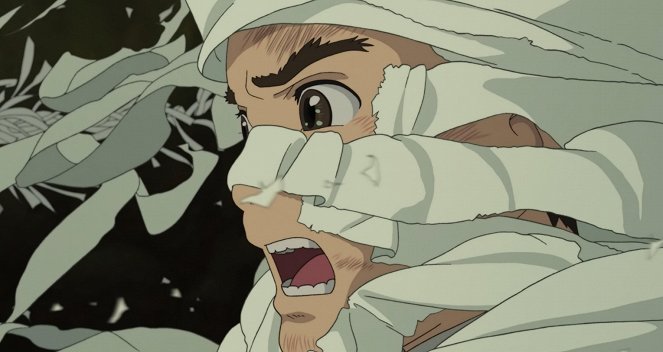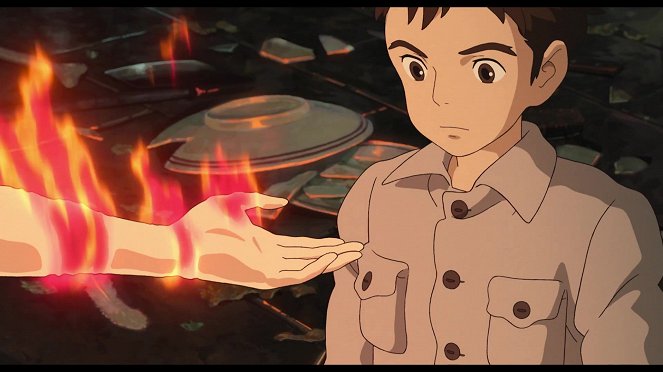Reżyseria:
Hayao MiyazakiScenariusz:
Hayao MiyazakiZdjęcia:
Atsushi OkuiMuzyka:
Joe HisaishiObsada:
Soma Santoki, Takuya Kimura, Jun Fubuki, Jun Kunimura, 小林薫, Karen Takizawa, Keiko Takeshita, Kō Shibasaki, 菅田将暉, Sawako Agawa, Shinobu Otake, Shôhei Hino (więcej)Opisy(1)
Po stracie matki Mahito wraz ojcem opuszcza Tokio i przeprowadza się na wieś. Zdystansowany do nowej, otaczającej go rzeczywistości zaczyna odkrywać niezbadaną okolicę i dom. Pewnego dnia przypadkowo spotyka zagadkową, mówiącą ludzkim głosem czaplę siwą, która nieoczekiwanie staje się jego przewodnikiem. Ptak stopniowo pomaga chłopcu rozwikłać tajemnicę życia, zabierając go do magicznego świata, gdzie przeszłość miesza się z teraźniejszością. (Nowe Horyzonty)
(więcej)Materiały wideo (5)
Recenzje (6)
The older Miyazaki gets, the less literal and linear his work becomes, the less regard he has for classic narrative concepts and the more he makes films solely for himself without any regard for others. And thanks to that, each of his new works that we have the good fortune to see for the first time is that much more fascinating and unique. So, it is time that we stop recounting which elements and motifs that his latest film has in common with those that came before. The most beautiful thing about Miyazaki’s films has always been that rare opportunity to forget about everything that we are accustomed to in run-of-the-mill audio-visual media and to let ourselves be carried away by the creator’s unique vision. Not only does one limit the degree of amazement by relating this film to the master’s previous work, but doing so also diminishes the distinctiveness of the film itself, which requires an open mind. Let’s also acknowledge that the title, The Boy and the Heron, originated as a meaningless placeholder in the heads of international distributors, who didn’t know what to make of the original title, which didn’t fit into any established categories. Let’s thus call the film by its real name: “How Do You Live?”. The original title pays tribute to the book of the same name, which was essential for the adolescent Miyazaki and even appears in the film. However, the filmmaker did not adapt it, rather only using its title as an allusion, as well as for a semantic framework for not only his new film, but for his overall work. Just as the concept of time fades away in the narrative and the elderly characters appear in their youthful form and the generations of a single family can come together at the same time, Miyazaki uses the question in the original title of his film to speak both to himself and to us about his own past and present. In his latest work, the filmmaker, who has devoted his entire productive life (which, in the case of the workaholic octogenarian, means to this day), uses another such narrative to give us an expressive look into the inner life of a young man buffeted by trauma, loss and apprehension about the life that lies ahead of him. In that inner self, new worlds that simultaneously exude uplifting boisterousness and the weight of inevitability are created using the basic building blocks of reality and fantasy, cemented together with emotions. Together with the titular question of how we will live in the face of an oppressive world, Miyazaki shows us through his protagonist how he himself coped with growing up in the shadow of war and the death of his beloved mother. Using the words of today’s audio-visual media, we could say that Miyazaki’s new film is the magnificent peak of his filmography (so far), as well as a meaningful prequel to it. In this film, Miyazaki presents to us the duality of beauty and terror, love and anger, and simply life and death, as he has done throughout his career so far. Each new Miyazaki film is like a half-read book left in the middle of a shelf by a missing uncle who went mad from reading countless books. Those films’ renown precedes them and evokes in us a feeling of awe at being in contact with something that will inevitably go beyond us, as well as foolish concern as to whether the films will live up to expectations. Therefore, we approach them only cautiously and sometimes, to our own detriment, we refuse to give in to them. But it is enough to break through the first wave on the horizon and let it wash away all doubts, and then just peacefully sail with an open mind aboard the narrative, which is held securely in the hands of the greatest master of cinema. And yes, again, it is a journey that overwhelms us with imagination many times, but it is also a journey from which we will always have memories of those peaceful moments when we realise that we are suddenly as calm and collected as the characters that we are watching. There is nothing more precious, more terrifying, more beautiful, more agonising, more turbulent or more comforting than each new Miyazaki film.
()
(mniej)
(więcej)
It was said that The Wind Rises would most likely be Miyazaki’s last film, but that turned out not to be the case. And The Boy and the Heron will not necessarily be the final chapter of his career either, though it is possible to see from it a bit of creative repetition as he looks back to his own work and passes the torch to the younger generation in the end, which is also presented in the story. In any case, the master of animation and film narrative has not eased up in terms of the number of ideas, the diversity of his visions and the depth of the ideas presented; his film looks beautiful and overflows with the magical, dreamlike, fairy-tale elements that can be alternately cruel and tender. The introduction of the film is uncomplicated and practically devoid of the supernatural, but as soon as the titular heron smiles and begins speaking with a human voice and the main (unfortunately not very interesting) protagonist falls into the fantasy world, in which he must come to terms with the loss of his mother and with feelings of pain, loneliness, anger and sadness, Miyazaki’s powers of imagination and playfulness kick into high gear. However, the effort to say as much as possible in the space of two hours leads to the fact that the film is very dense in places and doesn’t let some of the scenes fade out properly. At the same time, Miyazaki returns to his tried-and-try story formulas (he most noticeably draws from his own Spirited Away) and frequently used trademarks. The Boy and the Heron is practically a catalogue of everything that can be associated with Miyazaki’s films, but it doesn’t reach the level of his best works.
()
I'm a fan of Mr. Miyazaki's work. There was a time when I absolutely loved all his creations and had to watch one of his films at least once a year. From 2009 to 2012, I went to great lengths to track down his short films, even those exclusive to the Ghibli Museum in Mitaka. I adore his animation style, storytelling prowess, and the profound messages woven into his films, not to mention the delightful humor. But what truly captured my heart was his unparalleled imagination, which always felt uniquely beautiful to me. Naturally, I couldn't pass up the opportunity to watch another "last" film by Mr. Miyazaki. It delivered exactly what I anticipated. The animation was mesmerizing, the music underscored the best moments beautifully, and the fantasy world depicted was as enchanting as ever. The humor landed well too, with its cute jokes and light situational comedy eliciting smiles at just the right moments. The story intrigued me, and I appreciated its thematic depth. However, there was a minor hiccup. While the relationship between the boy and the heron resonated with me and unfolded organically, I found the portrayal of the boy's family dynamics, particularly his evolving relationship with his stepmother, less convincing. The abrupt character transformation felt jarring, leaving me somewhat detached during a pivotal moment. Consequently, the film's overall impact fell short of truly moving me. Upon leaving the cinema, I couldn't shake the feeling that I'd witnessed something great but not quite unforgettable, something that wouldn't occupy my thoughts for hours on end. In summary, The Boy and the Heron earns an 8/10 from me. It largely met my expectations for another Miyazaki production, but it didn't quite reach the pinnacle of his filmography. It's unlikely to be the first, second, or even third film that springs to mind when I think of Hayao Miyazaki.
()
Wonderful! Miyazaki's graciously poetic mind has conjured up a fantasy fairytale fable from post-war Japan, a bit in the style of Pan's Labyrinth. It is perhaps impossible to watch except with a permanent smile and the occasional tear in the eye. The animation is breathtaking and, in comparison, the Pixar, Disney and Sony trailers that preceded it are truly pathetic. It's not that I don't like CGI animation, but The Boy and the Heron simply took my breath away, something that didn’t happen (yet) when watching those other films.
()
It's not my cup of tea. I can appreciate the truly admirable animation and imaginative world-building, but I'd be lying if I said it satisfied me as a viewer. The one-dimensional, soft-spoken protagonist is a dull and uninteresting link between Hayao Miyazaki's many fantastic dream sequences. Emotionally, it completely passed me by and, especially in the last third, I found it quite annoying. Not a fan, sorry.
()
Galeria (32)
Photo © TOHO Company / Studio Ghibli


